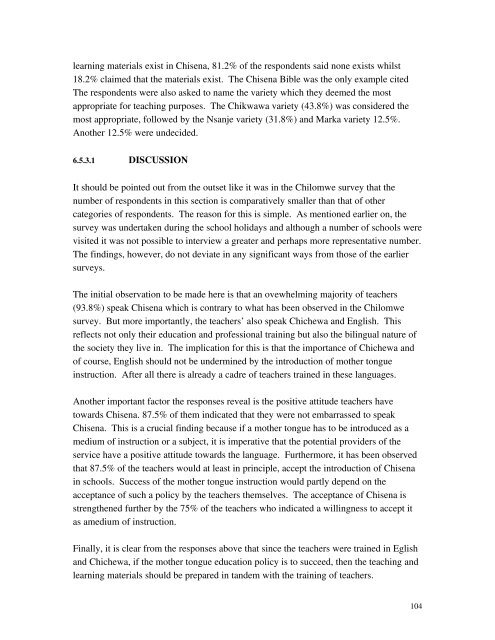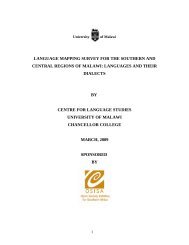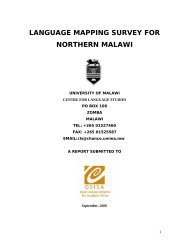SOCIOLOLINGUISTIC SURVEYS - Centre for Language Studies
SOCIOLOLINGUISTIC SURVEYS - Centre for Language Studies
SOCIOLOLINGUISTIC SURVEYS - Centre for Language Studies
Create successful ePaper yourself
Turn your PDF publications into a flip-book with our unique Google optimized e-Paper software.
learning materials exist in Chisena, 81.2% of the respondents said none exists whilst<br />
18.2% claimed that the materials exist. The Chisena Bible was the only example cited<br />
The respondents were also asked to name the variety which they deemed the most<br />
appropriate <strong>for</strong> teaching purposes. The Chikwawa variety (43.8%) was considered the<br />
most appropriate, followed by the Nsanje variety (31.8%) and Marka variety 12.5%.<br />
Another 12.5% were undecided.<br />
6.5.3.1 DISCUSSION<br />
It should be pointed out from the outset like it was in the Chilomwe survey that the<br />
number of respondents in this section is comparatively smaller than that of other<br />
categories of respondents. The reason <strong>for</strong> this is simple. As mentioned earlier on, the<br />
survey was undertaken during the school holidays and although a number of schools were<br />
visited it was not possible to interview a greater and perhaps more representative number.<br />
The findings, however, do not deviate in any significant ways from those of the earlier<br />
surveys.<br />
The initial observation to be made here is that an ovewhelming majority of teachers<br />
(93.8%) speak Chisena which is contrary to what has been observed in the Chilomwe<br />
survey. But more importantly, the teachers’ also speak Chichewa and English. This<br />
reflects not only their education and professional training but also the bilingual nature of<br />
the society they live in. The implication <strong>for</strong> this is that the importance of Chichewa and<br />
of course, English should not be undermined by the introduction of mother tongue<br />
instruction. After all there is already a cadre of teachers trained in these languages.<br />
Another important factor the responses reveal is the positive attitude teachers have<br />
towards Chisena. 87.5% of them indicated that they were not embarrassed to speak<br />
Chisena. This is a crucial finding because if a mother tongue has to be introduced as a<br />
medium of instruction or a subject, it is imperative that the potential providers of the<br />
service have a positive attitude towards the language. Furthermore, it has been observed<br />
that 87.5% of the teachers would at least in principle, accept the introduction of Chisena<br />
in schools. Success of the mother tongue instruction would partly depend on the<br />
acceptance of such a policy by the teachers themselves. The acceptance of Chisena is<br />
strengthened further by the 75% of the teachers who indicated a willingness to accept it<br />
as amedium of instruction.<br />
Finally, it is clear from the responses above that since the teachers were trained in Eglish<br />
and Chichewa, if the mother tongue education policy is to succeed, then the teaching and<br />
learning materials should be prepared in tandem with the training of teachers.<br />
104





